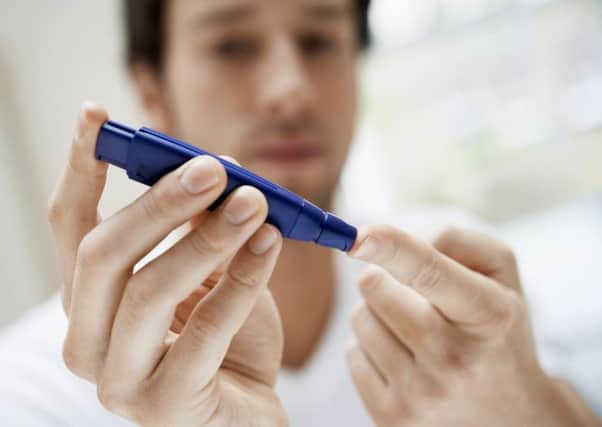New test could see diabetics off insulin jabs


The findings mean some sufferers swap daily insulin jabs for other medication.
Professor Mark Strachan, consultant in diabetes and endocrinology at the city’s Western General Hospital, says the test allows “precise” diagnosis and could be “life-changing” for some patients.
Advertisement
Hide AdAdvertisement
Hide AdIt has now been introduced as part of routine care for Type 1 diabetes at the hospital.
“We introduced the C-peptide blood test because it allows us to more precise in determining the underlying cause of somebody’s diabetes,” he said.
“Thus far we’ve tested over 400 people with Type 1 diabetes and we’ve identified there are some who actually have Type 2 diabetes and some who have other genetic forms of diabetes.
“We have already got seven people off insulin and onto other treatment and it’s very likely there will be more in the near future.”
Prof Strachan said the test provides more specific diagnosis of diabetes, allowing treatment to be personalised to individual needs.
It could also be used to identify children and others who are likely to develop the condition, potentially helping them avoid future complications such as eye disease.
Results from the blood testing are also providing new insights into diabetes.
It had always been thought Type 1 sufferers do not produce any insulin.
Advertisement
Hide AdAdvertisement
Hide AdBut recent research shows there are several variants of the condition.
“What we are discovering is Type 1 diabetes is probably more complex than we thought,” said Prof Strachan.
“We’ve always believed that people with Type 1 diabetes make little or no insulin themselves, which is why they have to take injections.
“What we’re seeing with the C-peptide test is a small cohort of people with true Type 1 diabetes are actually carrying on making insulin for a lot longer than we had imagined.
“That’s very different from what we had hitherto believed.
“So it is gaining us new insights as well as allowing us to diagnose diabetes more precisely and identifying people with Type 2 and genetic forms we though had Type 1.”
Health campaigners have welcomed the latest findings.
Dr Emily Burns, head of research communications at the charity Diabetes UK, said: “Getting the right diagnosis of diabetes is incredibly important, as it means you’ll receive the most effective treatment to help you best manage your condition.
“But different forms of diabetes can be difficult to accurately diagnose every time. Tests are available to spot rare forms of diabetes, or to identify cases of misdiagnosis, which can be life-changing for the person involved.
“However, it’s vital people living with Type 1 diabetes continue to use their insulin unless their diagnosis changes and they’re advised to do so by a healthcare professional.”